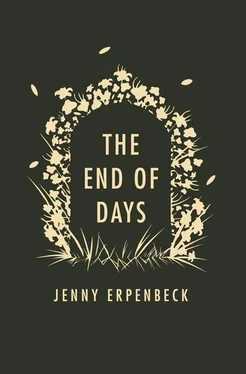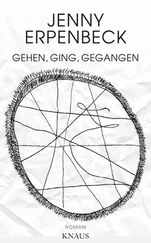Jenny Erpenbeck - The End of Days
Здесь есть возможность читать онлайн «Jenny Erpenbeck - The End of Days» весь текст электронной книги совершенно бесплатно (целиком полную версию без сокращений). В некоторых случаях можно слушать аудио, скачать через торрент в формате fb2 и присутствует краткое содержание. Год выпуска: 2014, Издательство: New Directions Publishing, Жанр: Современная проза, на английском языке. Описание произведения, (предисловие) а так же отзывы посетителей доступны на портале библиотеки ЛибКат.
- Название:The End of Days
- Автор:
- Издательство:New Directions Publishing
- Жанр:
- Год:2014
- ISBN:нет данных
- Рейтинг книги:4 / 5. Голосов: 1
-
Избранное:Добавить в избранное
- Отзывы:
-
Ваша оценка:
- 80
- 1
- 2
- 3
- 4
- 5
The End of Days: краткое содержание, описание и аннотация
Предлагаем к чтению аннотацию, описание, краткое содержание или предисловие (зависит от того, что написал сам автор книги «The End of Days»). Если вы не нашли необходимую информацию о книге — напишите в комментариях, мы постараемся отыскать её.
The End of Days — читать онлайн бесплатно полную книгу (весь текст) целиком
Ниже представлен текст книги, разбитый по страницам. Система сохранения места последней прочитанной страницы, позволяет с удобством читать онлайн бесплатно книгу «The End of Days», без необходимости каждый раз заново искать на чём Вы остановились. Поставьте закладку, и сможете в любой момент перейти на страницу, на которой закончили чтение.
Интервал:
Закладка:
One thing his wife realized long ago was that she couldn’t reproach him for his failure to rise through the ranks. She had to swallow her vexation, mulling it over in silence, and was increasingly to be found in a sour mood, impatient with the girls and with him.
The impression was that of a heavily laden cart driving rapidly across the rooftops, and only after this was a wavelike motion of the earth perceptible. There were even tremors high up in the mountains. The livestock in their alpine pastures stopped grazing, looking up with curiosity and unease. The merry little calves began leaping around.
Why did he just drop his coat instead of putting it on the hanger? Why did their older daughter quarrel with the younger one, instead of playing with her, why did the little one always start wailing like that when she bumped herself, why didn’t he go down to the cellar for firewood when he saw that more was needed, why didn’t he bring the clock to be repaired, or do something about the lost key? If he insisted on taking the girls to church every Sunday, why didn’t he come straight home for lunch afterward instead of strolling around with them? You forget that I’ve spent the entire morning standing in the kitchen cooking!
A piece of glass fell from a lamp’s cracked chimney, and an umbrella hanging from a nail fell to the floor. Whitewash fell from the ceiling of the church.
For a brief time he had nurtured the hope that by moving to Vienna they would all be moving to an easier life, but then there’d been four years of war, a capitulation, and four months of hunger, and now all their provisions — their supplies of wood, groceries, hope — were running out, the emptiness in the pantry and storeroom equally great, the dirt floor showing through. Here in Vienna, his wife was reproaching him for one last thing: having married her, a Jewish vixen from the provinces, and not even a rich one at that. Something he had always refused to believe was apparently proving true after all: she was trapped in her Mosaic origins as if in a cage, knocking herself black and blue against its bars.
11
Perhaps her father hadn’t gotten farther than Vienna when he abandoned his family. Perhaps she would run into him here at the market one day, and he would say: So there you are. When, as a little girl, she had tried to imagine where her father might be instead of with his family, she had always visualized someone who had hanged himself. Father might be in America, her mother had said. Or in France. Not that she’d believed her. But maybe her father really was right here in Vienna after all. Sometimes she forgets she was still an infant when he left. Even if he were to suddenly come walking down the street toward her, he wouldn’t be able to recognize her. Sometimes she asks herself how many people walk past each other in a big city like this without even dreaming that they might actually be related to one another. Sometimes she does, in fact, run into her mother at the market, and then they exchange a few words.
Well, child, how are you and the family?
Good.
Do you have enough to eat?
Yes.
Ever since her mother came to Vienna — supposedly because she was afraid of the war — that’s all her daughter feels like saying. There comes a time when a daughter should reply to her mother’s question as to how she is doing with only a simple: good.
They say an aid shipment just came in from Switzerland: 1500 tons of flour, the mother says.
Well, we’ll see, won’t we.
Your cousin’s helping you out with coal?
Uh-huh.
There comes a time when a mother should reply to her daughter’s question as to how she is doing with only a simple: good. Two years ago, this cousin brought the old woman with him when he fled to Vienna, he and his wife opened a shop for pipes, paper, and toys. Sometimes her mother helped out in their shop and received a potato, a bit of offal, a small piece of cornbread in return.
How are the girls?
Good.
When she herself was still a child and perhaps really might have needed her mother, her mother had driven off in her cart every day to the farms, leaving her with her grandparents. There was no father to look after her. Her grandmother had taught her to walk — she’d learned that from her grandmother when she went to say goodbye to her before leaving for Vienna. You took your very first steps between our crooked mud walls, and now you can go so much farther — all the way to Vienna , her grandmother had said. But no sooner had her grandmother died than her mother followed her to Vienna, and supposedly it was because the war frightened her.
Well then.
All right.
The moment when the old woman might tell her daughter about how the Poles had beaten her husband to death would never come.
You never — you never realize., the mother says.
Realize what?
You never realize how fast the time goes.
Uh-huh.
Her mother had never really spoken to her about where her father might be. Possibly he was in America, possibly in France. Her father must have had his reasons for leaving his wife so early on.
All right.
Be well, child.
The goy is fine, but now her daughter has been left hanging between two worlds, dangling, flailing, she has no choice but to brace her feet against her mother, pushing herself away from her — her mother, whose features as she ages are now so clearly marked as
belonging to the race of David that she is often harassed on the street, skipped over at the soup kitchen, and insulted by her neighbors.
You, too.
If her mother hadn’t married her to a goy, she wouldn’t be someone’s mistake for her entire adult life.
12
Touching the merchandise is strictly prohibited.
The future is not lowering its prices, certainly not in times like these; but you can only buy it with the past. Lot’s wife, who was too weak to leave her homeland without a final glance, who turned back knowing that the place she would see was destined for destruction, was turned into a woman of salt. This daughter is smarter. When her mother came to join her in Vienna as a refugee the first year of the war, she had kept her in her own apartment for only a few days and then as quickly as possible found one for her far enough away from her own. How lovely is your dwelling place, oh Lord of Hosts. Her daughters were being given a Christian upbringing and weren’t sent to visit their grandmother even once. The forest provides wood for the axe that will chop it down. Each living being exhausts its own resources for those who will come after, that’s what growth is. The old woman made her daughter the gift of a path leading away from her. At the moment, this path appears to be destroying her child, but it’s quite possible that her granddaughters will reach the goal. Some are destined to stay behind, some to depart, and yet others to arrive.
That’s how life works.
Fifteen hundred tons of flour from Switzerland, the mother said.
Well, we’ll see.
13
They returned from Alserstrasse to the apartment on foot, and now they are waiting for time to pass — all at once it’s become so slow. He sits beside her in the kitchen, bent over, his elbows propped on his knees, gazing at the floor in silence. Only when she hears the regular dripping does she look at him and see that tears are running down his cheeks to the tip of his nose, collecting there, and dripping to the floor tiles at his feet. Then she wants to go home. And then he says she should stay. What, stay? Stay overnight with him — who is now alone? He grabs her by the shoulders and weeps into the crook of her neck, or was it really a kiss? What? Happiness cuts shame, shame covers unhappiness, unhappiness unfurls happiness. Hope pushes aside grief, proving to be so much stronger — so strong that it surprises even the seventeen-year-old herself, this is the intensity of women fighting over bread in front of the Anker bakery — the old ones are often stronger than the younger ones, though they are so much closer to dying. Suddenly alert with hopefulness, she says: Yes, and follows the man, not heading for the vestibule this time, as she’s always done when spending the night here, but instead lying down next to him at his request, obediently lying down in the bed of her friend, lying for the first time beside the man whom she has loved ever since he returned home from the war that past December like someone she’d never seen before. What? She lies down in the place of her dearest friend, who has been dead only since the morning, 3:20 a.m. The end of a day on which a life has ended is still far from being the end of days. Inconsolable, she will now — what? — inherit what belonged to her friend, who yesterday was still warm; she will metamorphose into her friend and continue her conversations in her body with their beloved. Has anyone before seen such soft lips on a man who was forced to kill so as not to be killed himself, has anyone seen such shiny, wetly gleaming teeth, and a nose whose nostrils flare with arousal, has anyone seen such long lashes shading a pair of eyes — such beautiful shadows — these lashes brought home unsinged from all the fires? Ever since the moment when he was standing there unexpectedly at the door, she has known that this is the man who was destined for her all along, and now at long last he knows it too, at long last he is lying beside her just as she imagined countless times, breathing so close beside her that she can inhale his breath, and if it weren’t so dark, she would surely be able to see him gazing at her through the night, gazing all the way through her. What?
Читать дальшеИнтервал:
Закладка:
Похожие книги на «The End of Days»
Представляем Вашему вниманию похожие книги на «The End of Days» списком для выбора. Мы отобрали схожую по названию и смыслу литературу в надежде предоставить читателям больше вариантов отыскать новые, интересные, ещё непрочитанные произведения.
Обсуждение, отзывы о книге «The End of Days» и просто собственные мнения читателей. Оставьте ваши комментарии, напишите, что Вы думаете о произведении, его смысле или главных героях. Укажите что конкретно понравилось, а что нет, и почему Вы так считаете.












